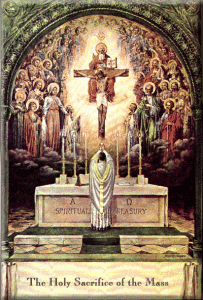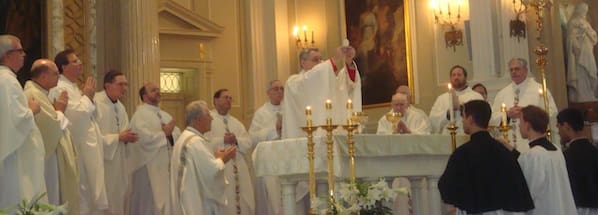 Q. Dear Father John, What is the difference between those who find Mass something to be endured and those who find it deeply nourishing, and what does my experience have to do with my own disposition?
Q. Dear Father John, What is the difference between those who find Mass something to be endured and those who find it deeply nourishing, and what does my experience have to do with my own disposition?
A. The short answer to this question is: don’t worry about your experience of Mass, just focus on the Mass. Read on for the long answer.
Underlying this excellent question is a faulty premise: it assumes that “something to be endured” and “deeply spiritually nourishing” are mutually exclusive. But that is not always the case. This is because the level of the spirit is deeper than the level of emotions. In our consumer society, which keeps our emotions titillated and conditions us to think that true spiritual value should always be accompanied by lovely feelings, the distinction between spirit and emotion is almost unrecognizable for many people. But the distinction is real nonetheless.
Think of a good mother whose young child is very sick with a horrible fever. That mother will sacrifice sleep, meals, recreation, exercise – you name it, she’ll sacrifice it, simply in order to stay with, tend, care for, and comfort that child. After three or four days, the mother will be emotionally and physically exhausted; her feelings will not be lovely, but raw. And yet, in the realm of her spirit, she will be profoundly fulfilled and satisfied, because she knows she is doing all she can for her sick child. The spiritual virtue of self-sacrificial love is located at a deeper place than our feelings and emotions. Sometimes spirit and emotion coincide, like on a wedding day, but not always.
The same two levels are at work in our prayer life. Sometimes we feel God’s presence in an emotional way, and it is gratifying. This is a gift of the Holy Spirit, and we should be grateful. But still, the gratifying feelings are not the substance of our prayer. That takes place at a deeper level, where we are exercising our faith, hope, and Christian love by seeking the face of God, adoring and praising him, and renewing our commitment to follow him – regardless of how we feel. Some days when we pray, we spend the whole time fighting distractions or sleepiness, and we don’t feel God’s presence at all. Yet, that prayer, if it was sincere and if we were struggling to seek God’s face and renew our love for him, was just as valid, just as fruitful, and just as pleasing to God as the one during which our emotions were high. In fact, the more difficult prayer may have been even more pleasing to God, because love in a fallen world is always more evident in sacrifice than in enjoyment.
Mass is the same. We know that the holy sacrifice of the Mass is the pinnacle of worship, the perfect prayer. But that doesn’t mean that we will always feel, emotionally, the exaltation. What matters is not our feelings. What matters is the attitude of our mind and will. If we are making an effort to unite ourselves, at the level of our spirit, to the meaning of each part of the Mass, we are giving glory to God and nourishing our souls (and building up the Church), whether we feel exalted or whether we feel bored, distracted, frustrated, angry, or [insert whatever emotion you like].
Therefore, we must dispose ourselves for Mass by stirring up the spiritual desires of a true Christian: to honor God by saying “yes” to him, just as Christ did on the Cross. These desires are expressed beautifully in all the prayers and rubrics of the sacred liturgy. Uniting the attention of our mind and the intention of our will to those prayers and rubrics is our task. We dispose ourselves for that by striving to live each day as Christ would have us, and by arriving to Mass a few minutes ahead of time to recollect ourselves. We should never think that feeling God’s presence in an emotional way is the only evidence that we have disposed ourselves properly for the celebration. We should not pursue a particular emotional experience at Mass. The Mass is not about us; it is about Christ. If God wants us to feel the exaltation, blessed be God. If not, blessed be God. We go there to worship, confident that, because it is the liturgy, it is the highest objective act of worship we can participate in, regardless of how we feel.
This is already too long, but one other point deserves mentioning. The manner in which the liturgy is celebrated can help us focus on Christ, or it can hinder us. Reverential and beautiful demeanor, music, and accoutrements are effective aids to our worship, and they are also signs of our love for God. Yet, they are not the core of the Mass, and we should not treat them as if they were. The soldiers who attended Masses celebrated on the hoods of jeeps near the battlefields of World War II experienced Christ deeply in spite of their grungy surroundings. They experienced him deeply because their daily lives were more in tune with the eternal truths than the latest gossip. The best preparation for Mass is a day-to-day life spent consciously in pursuit of Christ’s Kingdom.
Yours in Christ, Father John Bartunek, LC





